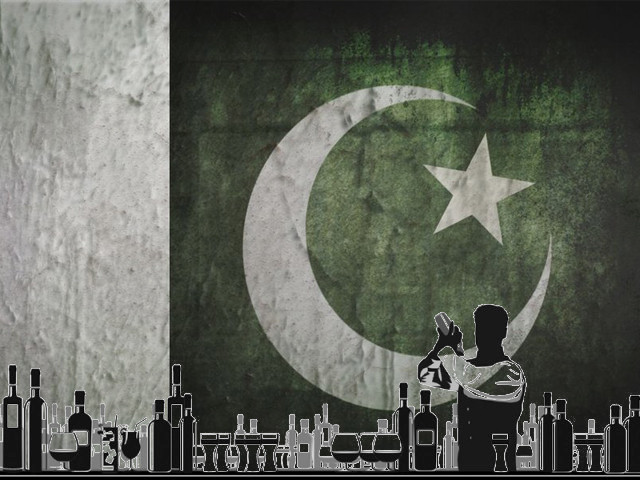Celebrated Muslim poets like Omar Khayyam and Rumi often wrote about wine and intoxication, while there are claims that Allama Iqbal and Jinnah used to indulge in a little ‘suroor’ (intoxication) themselves. The modern Muslim world isn’t any different; the Middle East experienced a 70% growth in the sales of booze from 2001 to 2011. It has a high Muslim population in countries like Lebanon, Turkey and Egypt that have legalised alcohol. Malaysia, another Muslim dominated country, has been titled the “world's tenth largest consumer of alcohol” by WHO.
Alcohol is neither alien for the Muslim world in general nor for Pakistan in particular. It was served at state-level get-togethers till the late 1970s and accounts of its undeterred consumption in the army circles have also been narrated. This was before Zulfiqar Ali Bhutto banned it to appease the religious elements - something which later took shape of the contentious Prohibition (Enforcement of Hadd) Order, 1979 during Zia’s dictatorship.
Advocate Bilal Shadani explained the statute is divided in two parts; punishment by Hadd and punishment by Tazir.
“Hadd punishment of 80 lashes is passed where the Muslim accused provides a confession of having imbibed alcohol, and/or a testimony by two others who have witnessed the accused drinking.”
On the other hand,
“Tazir punishment of 30 lashes and/or up to three years imprisonment,” he added, “is awarded where the accused is found with alcohol but its purpose cannot be ascertained.”
This strict legislation is aided by the social repulsion that is observed against alcohol. Despite all this, Pakistan, a country with 97% Muslim population, still hosts parties and raves like Anthony Papa where alcohol and substance consumption is common. Although these are usually attended by the upper-crust of the society, the poorest of the poor also buy substandard liquor to quench their thirst, even at the cost of their lives.
Since there are only a few licensed distribution channels of alcohol, bootlegging has become a lucrative business. It has been observed that while a regular Murree Brewery vodka costs around Rs800, bootleggers charge double the amount in the black market. Imported booze are available from Rs3000 to Rs10, 000 a bottle and a high profit margin has encouraged many bootleggers to sell only those. Many also provide home delivery, reaching you ‘quicker than a pizza would,’ according to Sadaqat Ali who manages rehabilitation centres set up for alcoholics in Pakistan.
It doesn’t end here; officials who are expected to assist the cause of this legislation are found unabashedly flaunting it. Maybe this explains why the only licensed brewery is thriving while illegal ones have also been set up. The business is in such boom that many people now also work as part-time bartenders, ardently shaking and adding ingredients to serve complex cocktails across Pakistan.
In light of the high alcohol consumption and failure of the current law to act as a deterrent, it is time for less stringent but smart policies. The demand is not to make booze freely available as our MPA, Mr Khokhar and his likes are vocal about. The demand is to evolve the law in respect of the changing circumstances, as has already been laid out in the case of Muhammad Aslam Khaki vs. Federation of Pakistan;
“Court while convicting an accused is to take into consideration the overall condition of society at large.”
It suffers from many ambiguities and defects as it stands now, as the ex Chief Justice of Federal Shariat Court Haziqul-Khairi pointed out. The law works on the presumption that there will be a preference by the accused to file for an appeal or bail. In case of a failure, he/she will remain in prison till the time for filing them expires.
This imprisonment acts as double punishment – neither given in the Quran nor Sunnah and in contradiction of Article 13 of the Constitution.
Punishment by Hadd according to the Prohibition (Enforcement of Hadd) Order, 1979 is contradictory to Islamic teachings. An accused can be charged under Hadd and awarded 80 lashes. But Islam has only confirmed some specific offences as Hadd (heinous crimes) and alcohol is not one of them.
In light of Verse 2:219 of Surah Baqrah, the Holy Quran has recognised some of its ‘benefits,’ and so, the sin of drinking is not absolutely haram. It is but a minor sin.
Instead of half-heartedly enforcing ineffective and authoritarian laws like the Prohibition (Enforcement of Hadd) Order, 1979, the government can allow its sale on regulated prices in a controlled environment. It can discourage consumption through heavy taxation, which will not only generate hefty revenue but also discourage people from drinking. Muslim countries like Bangladesh have already put in place similar models.
The argument that drinking ought to be a personal choice which the state should not dictate is also put forward by many. If it is forbidden in Islam; instead of the state enforcing strict legislations, Muslims should themselves resolute to not drink, it is argued.
Shouldn’t faith be a stronger limitation than laws imposed by the state?
Read more by Sabeer here.



COMMENTS
Comments are moderated and generally will be posted if they are on-topic and not abusive.
For more information, please see our Comments FAQ